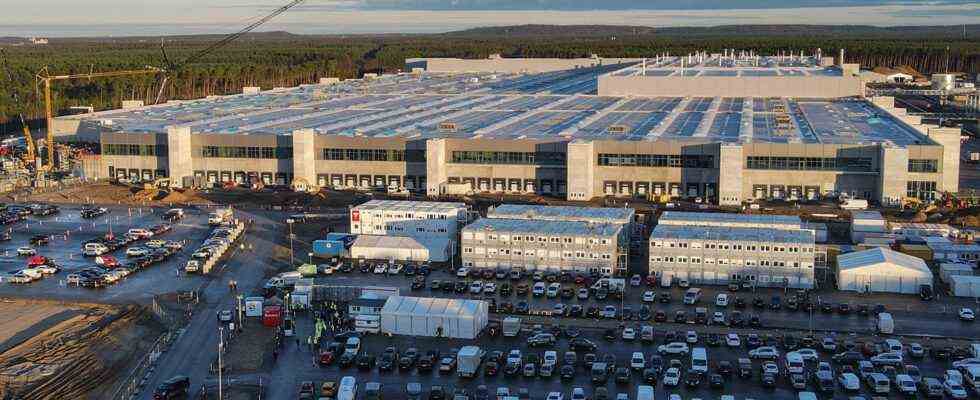Status: December 30, 2021 8:30 a.m.
Tesla is one step closer to commissioning its first factory in Europe. The electric car manufacturer submitted the last remaining documents for the approval process.
Will there soon be more than just test vehicles rolling off the assembly line? An important hurdle for the decision about Tesla’s first European factory in Grünheide near Berlin has been cleared. According to the Brandenburg state government, the US electric car manufacturer submitted the documents that were still missing for the approval process.
“At the end of the 50th calendar week (13-19 December), the outstanding documents and information were received, which form the basis for a decision on the Tesla application,” said a spokesman for the Ministry of the Environment dpa. These documents would now be checked by the State Office for the Environment and the Lower Water Authority of the Oder-Spree district, among others. “A date for the decision can therefore not be given.”
“Don’t stumble in the last few meters”
Brandenburg’s Prime Minister Dietmar Woidke (SPD) is asking for patience. “I’m optimistic, but we mustn’t trip over the last few meters,” he said. “It is now important that we continue to do everything we can with the necessary patience to let the approval process continue to run professionally. We depend on, but above all on Tesla itself, that a legally secure approval is available at the end of the day.”
It is of no use if the approval in the end in court fails in whole or in part. So far, Tesla has shown a “tremendous speed”, which has demanded all sides. “Two years ago there were smaller pines on the area where a car and battery factory is now being built.”
The electric car pioneer has been building its Gigafactory in Grünheide and thus its first production site in Europe since spring 2020. Tesla boss Elon Musk had hoped that the first cars in Grünheide could roll off the production lines in December 2021 at the latest. Vehicles are now being produced there, but currently only through internal tests. According to Tesla, the start of mass production was always planned for 2022. So far, the company is building its factory through several early approvals.
Woidke calls for faster approval procedures
Construction stops due to elapsed payment deadlines, the laying of sewer pipes without the permission of the authorities, illegal coolant tanks or the plans to build a battery factory in addition to the car factory: There were several reasons for delaying the billion-dollar project in Grünheide this year. Prime Minister Woidke is generally pushing for faster approvals.
“We urgently need an acceleration of the approval process in the way that it was 30 years ago in the eastern German states,” said the SPD politician. “To this end, the length of the procedures in the authorities and the number of legal bodies to which objections can be lodged against the projects must be clearly limited.”
“If we now accept a ‘business as usual’ with the expansion of renewable energies, the construction of transmission networks and the expansion of rail connections, we will not be able to ensure climate neutrality and prosperity,” warned Woidke. The SPD, the Greens and the FDP have agreed in the coalition agreement that the planning and approval process should be faster.
Environmental associations are suing for permission to pump water
In Brandenburg, the green light is generally expected soon. The approval is now foreseeable, stressed Woidke to the rbb. “It will probably be early this year.” However, there could be conditions because one of the basics for early approval is a positive forecast for the entire project.
Conservationists fear negative consequences for the environment and drinking water. Tesla had denied the concerns. The environmental association Green League Brandenburg sees several questions unresolved. The classification of the waste according to the Waste Catalog Ordinance and the Hazardous Incident Ordinance does not seem to have been conclusively clarified, said state manager Michael Ganschow. It is not known whether there is a discharge permit for the waste water from battery production. It is feared that toxic chemicals will get into the groundwater in the event of an accident.
In addition to unanswered questions about the seepage of rainwater, an illegal use permit under water law could also mean that the water supply for Tesla is not secured. Proceedings are pending before the Frankfurt (Oder) administrative court. In addition, the insufficient protection of species and the transport links are also criticized.

